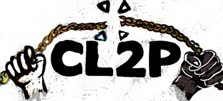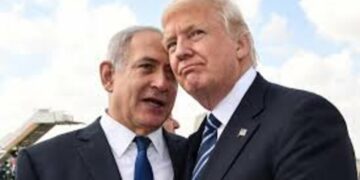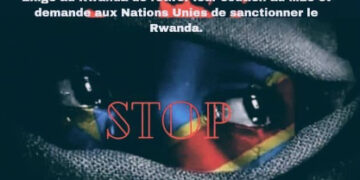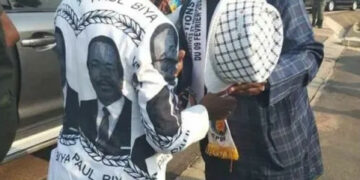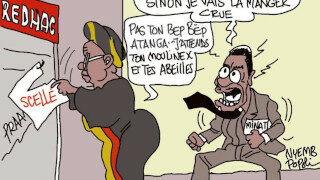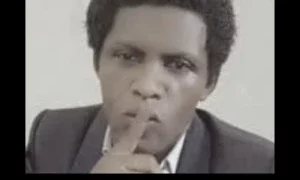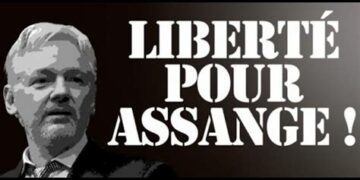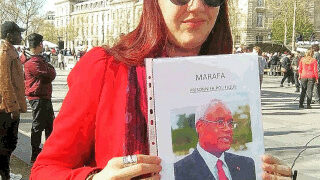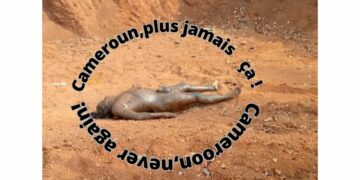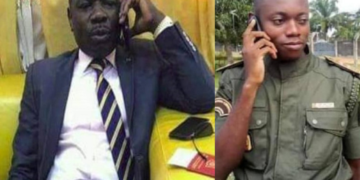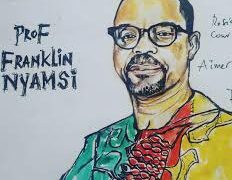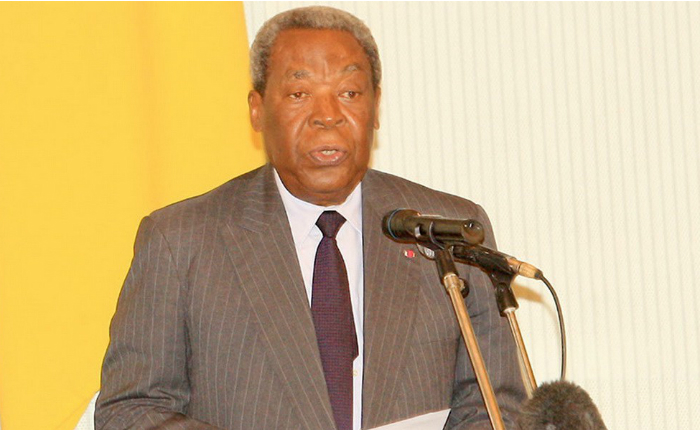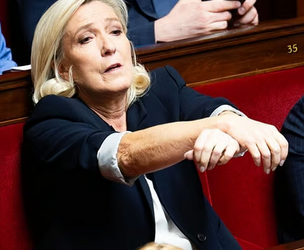Le bien commun et la politique tribale au Cameroun: à propos de Niat le Boulou
Par Olivier J. Tchouaffe, PhD, Porte-parole du CL2P
Il est intéressant de noter que Patrice Nganang, qui semble trop obsédé par la politique tribale, a qualifié le président du sénat, Marcel Niat Njifenji, de «Boulou». En pratique, selon Nganang, le pouvoir est par essence quasiment tribal au Cameroun. Ainsi, il n’y a pas d’autre forme de contrat social en dehors des allégeances tribales qui naturalisent un système patrimonial de patronage et de clientélisme, où seules les personnes qui ont prêté allégeance au roi tribal, Paul Biya, sont autorisées à siéger à la mangeoire. En ce sens, les Camerounais ordinaires qui veulent manger doivent être soumis à Paul Biya. Toujours suivant cette logique, comme pour Marcel Niat Njifenji, la plupart des camerounais qui servent Paul Biya deviennent des tribalistes par nécessité. Ils développent ces comportements tribaux comme un mécanisme d’adaptation, comme des compétences de survie nécessaires pour exceller dans une société tribale qu’est le Cameroun.
Ainsi, il n’y a pas de politique sans rechercher l’approbation et la validation du chef de tribu au Cameroun, transformant le pays en un culte où aucune critique du chef n’est tolérée. Dans ce processus, Nganang délégitimise la politique déclarée de «l’équilibre régional», acté dans le fonctionnement des institutions et en vigueur dans le pays, une politique visant à une répartition égalitaire des ressources parmi les diverses ethnies du pays. En tant que tel, les Camerounais ordinaires n’ont d’autres formes de légitimité que de vendre leurs âmes au diable, par conséquent, aucune possibilité d’entrer dans une logique de contribution.
À ces propos, les organisations de défense des droits humains, telles que le CL2P, qui ont travaillé sans relâche avec d’autres pour la libération du Dr Nganang du cachot de Biya, ne peuvent s’empêcher d’être troublées par son obsession tribale.
Le CL2P est une organisation internationale multiraciale et multiethnique de défense des droits humains et qui ne soutient pas le régime de Biya, mais condamne la manipulation obsessionnelle et paranoïaque de la politique tribale qui, en fait, rabaisse tous les Camerounais. Ce genre d’attitude fait le jeu des tribalistes et de Biya qui ont passé 35 ans au pouvoir en infantilisant les Camerounais ordinaires comme des enfants masochistes incapables d’un égoïsme éclairé, soutenant un régime tyrannique seulement à cause d’une peur existentielle inconsciente de la mort, et l’espoir de recevoir un jour de maigres miette du régime. En somme, des individus incapables de comprendre les politiques de l’inégalité quand celle-ci les frappent au visage et de plein fouet.
Donc, en jouant dans ce genre de politique tribale, Nganang par inadvertance dénigre, non seulement Niat, mais en fait tous les Camerounais, et élimine les questions de fond qui importent le plus aux Camerounais ordinaires. Il questionne l’intelligence et les motivations de la grande majorité des Camerounais et des organisations comme le CL2P. Et il s’aligne idéologiquement sur un régime qu’il prétend combattre et qui était assez stupide pour en faire un martyr et lui offrir une tribune internationale. Si cela ne fait pas de lui un allié du RDPC et de la politique tribale de Biya, je ne sais pas ce qu’il en serait alors qu’en fait il plaide pour l’autonomisation de l’Etat contre les institutions de la société civile à travers la politique tribale. En effet, la politique tribale tend à renforcer l’État comme l’a démontré les travaux des intellectuels comme Jean-François Bayart. Mais quoi qu’il en soit, cela ne peut pas être bien pire que ce que Patrice Nganang a déjà dit et fait, notamment depuis sa libération médiatisée du mouroir carcéral de Kodengui.
Le CL2P a une longue liste de prisonniers politiques qui ne correspondent pas à la définition de la politique tribale de Nganang.
Si nous suivons la logique de Nganang, il n’y aurait aucun prisonnier politique Boulou. Mais le fait est qu’il y en a beaucoup dans les prisons de Biya. Dans la même veine, pourquoi des gens qui étaient déjà des grands commis accomplis de l’État avant l’avènement du régime de Biya, tels que Pierre Désire Engo, ou des hommes d’affaires prospères d’une famille puissante et financeur du RDPC, comme Yves Michel Fotso, étaient ou sont actuellement en prison? Pourquoi diantre une organisation des droits de l’homme telle que le CL2P voudrait-elle être l’esclave du régime de Biya?
Il est important de reconnaître que Nganang n’a pas inventé la politique tribale au Cameroun. Cependant, il devient le symptôme pathologique d’une politique cynique dans laquelle nous perdrons tous, si le contrat social, qui est la base de ce pays, est conduit par le tribalisme. Nous allons continuer à être moins bien lotis que nous l’avons déjà été au cours des 35 dernières années. Le CL2P croit qu’il y a un bien commun, et si le discours tribal actuel peut au moins aider à une chose, c’est d’engager une discussion franche et directe sur la possibilité de rétablir un sentiment de bien commun au Cameroun.
Olivier J. Tchouaffe, PhD, Porte-parole du CL2P
[spacer style="1"]
English version
Common Good and Tribal Politics in Cameroon: On Niat the Bulu
By Olivier J. Tchouaffe, PhD, Spokesman of the CL2P
It is interesting that Patrice Nganang, who by now seems too much obsessed with tribal politics, labelled the president of the senate, Marcel Niat Njifenji, as “Bulu.” In practice, according to Nganang, power is by nature quintessentially tribal in Cameroon. Thus, there is no other form of social contract besides tribal allegiances naturalizing a patrimonial system of patronage and clientelism where only people who paid allegiance to the tribal King, Paul Biya, are allowed to sit in the meangeoire. In this sense, ordinary Cameroonians who want to eat have to be subservient to Paul Biya turning the country into a cult where no criticism of the chief is tolerated.
Following that logic, as with Marcel Niat, most Cameroonians who serve Paul Biya become tribalist out of necessity They develop these behaviors as a coping mechanism, as survival skills needed to excel in a tribal society.
Thus, there is no politics without seeking approval and validation from the tribal chief in Cameroon. In the process, Nganang delegitimizes the stated politics of “regional equilibrium” in vigor in the country, a policy aimed at an egalitarian distribution of resources among the country’s diverse ethnicities in the country. As such, ordinary Cameroonians have no other forms of legitimacy than selling their souls to the devil, consequently, no possibility to enter into a logic of contribution.
Human right organizations, such as the CL2P, which have worked tirelessly for the liberation of Dr. Nganang from Biya’s dungeon cannot help but being confused by Nganang’s tribal politics.
The CL2P is an international and multi-ethnic human right organization which does not support the Biya’s regime but condemned the obsessional and paranoid manipulation of tribal politics which in fact demean all Cameroonians for that matter. This kind of attitude plays right into the hands of tribalists and the Biya’s which has spent 35 years in power infantilizing ordinary Cameroonians as masochistic children incapable of enlightened self-interest supporting a tyrannical regime only because of an unconscious existential fear of death and the hope of meager handouts. Thus, are incapable to understand politics of inequality when they hit them in the face.
So, by playing into this kind of tribal politics, Nganang inadvertently, disparages, not only Niat, but in fact all Cameroonians and tunes out the issues that matter most to ordinary Cameroonians. He questions the intelligence and the motivations of the vast majority of Cameroonians and organizations such as the CL2P. And he ideologically aligns himself with a regime he claims to be fighting against and who was stupid enough to make him a martyr and giving him an international platform, never more so than in the 35 years.
If that does not make him an ally of the CPDM and Biya’s tribal politics, I do not know what would when in fact he argues for empowering the state against institutions of civil societies through tribal politics. Indeed, tribal politics tend to empower the state as Jean-Francois bayart’s work has demonstrated, but, whatever it is, it cannot be much worse than the things Patrice Nganang has already said and done.
The CL2P has a long list of political prisoners who do not fit Nganang’s definition of tribal politics.
If we follow Nganang’s logic, they would not be any Bulu’s political prisoners but the fact is that there are many of them in Biya’s prison. In the same vein, why does people who were already accomplished civil servants before the Biya’s regime, such as Pierre Desire Engo, or successful businessmen from a powerful CPDM’s family such as Yves Michel Fotso were or are currently in prison? Why a human right organization such as the CL2P would want to be a slave of the Biya’s regime?
It is important to recognize that Nganang did not invent tribal politics in Cameroon. However, he is becoming the pathological symptom of a cynical politics in which we will all lose if the social contract, that is the basis of this country, is driven by tribalism. We will only going to continue to be worse off as we been in the past 35 years. The CL2P believes that there is a common good and if the current tribal discourse can help in one thing is to ignite a discussion about whether we can re-establish a sense of common good in Cameroon.
Olivier J. Tchouaffe, PhD, Spokesman of the CL2P
